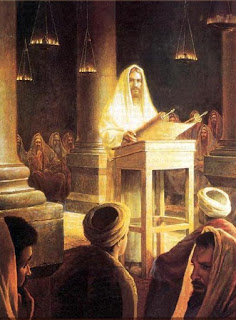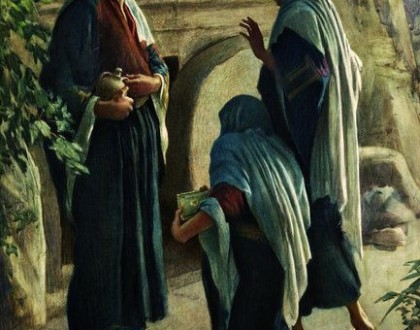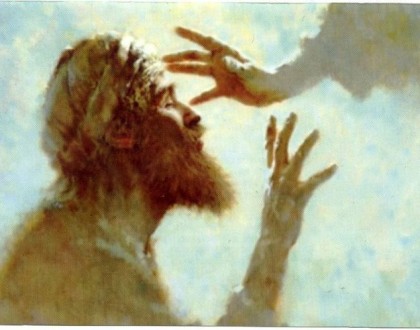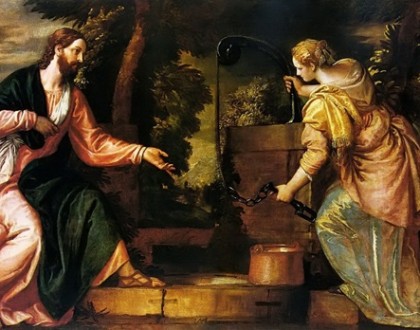Fourteenth Sunday in Ordinary Time, Year B – July 5, 2015

Fourteenth Sunday in Ordinary Time, Year B – July 5, 2015
We know today’s Gospel story well, perhaps too well! It would have been customary for Jesus to go to the synagogue each week during the Sabbath, and when his turn came, to read from the scriptures during the Sabbath service.
His hometown folks listened ever so attentively to his teaching because they had heard about the miracles he had performed in other towns. What signs would their hometown boy work on his own turf?
In today’s story, Jesus startled his own people with a seeming rebuke that no prophet of God can receive honour among his own people. The people of Nazareth took offense at him and refused to listen to what he had to say. They despised his preaching because he was from the working class; a carpenter, a mere layman and they despised him because of his family. Jesus could do no mighty works in their midst because they were closed and disbelieving toward him.
If people have come together to hate and to refuse to understand, then they will see no other point of view than their own, and they will refuse to love and accept others. Does the story sound familiar to us? How many times have we found ourselves in similar situations?
Homecoming
We often think that Luke is the only evangelist who records Jesus’ visit to Nazareth,“where he had been brought up” and that episode in the Nazareth synagogue (Luke 4:16). Mark and Matthew also refer to this episode, although without mentioning the name of the town, calling it simply “his hometown” or “his native place” (Mark 6:1; Matthew 13:54).
There are, however, several differences between the story told by Luke and those of Mark and Matthew. In the Gospels of Mark and Matthew, people consider the humble origin of Jesus who was “the carpenter”(Mark 6:3),“the son of the carpenter”(Matthew 13:55) and use it to doubt the greatness of his mission. Luke, on the other hand, makes no mention of Jesus’ humble origins.
In Mark, Jesus’ visit to his hometown is found not at the beginning of his ministry, but after a long period of preaching the Gospel and healing, even after the talks on the parables (Mark 4:1-34) and the resurrection of Jairus’ daughter (Mark 5:21-43).
What was the meaning of the peoples’ questions about Jesus in Mark’s account (6:1-6) that forms this Sunday’s Gospel? ‘Where did this man get all this? What kind of wisdom has been given him? What mighty deeds are wrought by his hands! Is he not the carpenter, the son of Mary, and the brother of James and Joses and Judas and Simon? And are not his sisters here with us?’ And they took offense at him.”
“Who do you think you are?” they seem to be asking him. Jesus sees that the questions about him correspond to a deeply possessive attitude: Is not this the carpenter, the son of Mary, and therefore one of us? You belong to us and therefore you must do for us all that you are able to do. We own you!
“Prophets are not without honour except in their hometowns and among their own kin, and even in their own homes.” Jesus resists the possessive attitude manifested by his people. The people of Jesus’ native place were suffering from a particular form of blindness — a blindness that sometimes affects us, too. Jesus refuses to place his extraordinary gifts at the service of his own people, putting strangers first.
Vision of the Big Picture
A wide vision and a great spirit, our reactions are very often filled with jealousy, selfishness, and meanness of spirit.
Today’s Gospel shows how difficult it is for us to attain to a universal vision. When we are faced with someone like Jesus, someone with a generous heart, a wide vision and a great spirit, our reactions are very often filled with jealousy, selfishness, and meanness of spirit. His own people couldn’t recognize the holiness of Jesus, because they had never really accepted their own.
They couldn’t honour his relationship with God because they had never fully explored their own sense of belonging to the Lord. They couldn’t see the Messiah standing right beside them, because he looked too much like one of them. Until we see ourselves as people beloved of God, miracles will be scarce and the prophets and messengers who rise among us will struggle to be heard and accepted for whom they truly are.
In today’s Gospel story, Mark tells us that Jesus was amazed at their unbelief. Listening to Jesus, his own people were initially filled with admiration in him and pride because of him. His message of liberation was marvellous. Then they recognize this young prophet as one of them and they say: “Is not this the carpenter, the son of Mary?”
The most severe critics are often people very familiar to us, a member of our family, a relative, or neighbour we rub shoulders with on a regular basis. The people of Nazareth refused to renounce their possessive attitude toward Jesus. When possessive love is obstructed it produces a violent reaction. This sort of reaction provokes many dramas of jealousy and passion. They took offence at him in Mark’s account just as “everyone in the synagogue was enraged (Luke 4:28) and they sought to kill him” (4:29) in Luke’s version of the story. Refusal to open our heart can lead to such extremes.
Jesus was bitterly criticized because he demonstrated great openness of heart, particularly toward people on the fringes and borders of society. His openness caused rising opposition that led him to the cross.
In the Acts of the Apostles we read more than once that the success of St. Paul’s preaching to the gentiles provoked jealousy among some of the Jews, who opposed the Apostle and stirred up persecution against him (Acts 13:45; 17,5; 22,21-22). Also within the Christian community, we need only recall the situation in Corinth where similar possessive attitudes caused serious harm when many believers attached themselves jealously to one apostle or another; causing conflict and division in the community.Paul had to intervene forcefully (1 Corinthians 1:10-3:23).
Today’s Gospel warns us to be on guard against certain attitudes that are incompatible with the example of Jesus: the human tendency to be possessive, and egoistic and small in mind and heart. We cannot forget that Jesus is the Saviour of the world (John 4:42), and not of the village, town, city or nation!
In order to approach and imitate Jesus, who is total beauty and uniqueness, the quality of magnanimity is necessary in our hearts and minds. The opposite and enemy of magnanimity is envy. Envy is that fault in the human character that cannot recognize the beauty and uniqueness of the other, and denies the other honour. Envy can no longer see because the eyes are “nailed shut,” blinded to one’s own beauty and the beauty in others. Envy inevitably leads to forms of violence and destruction, of self and of others.
Let us pray that Jesus not be amazed at our own unbelief, but rather rejoice in our small, daily acts of fidelity to him and our service to our sisters and brothers. May the Lord grant us magnanimous hearts so that we may look far beyond ourselves and recognize the goodness, greatness and beauty of other people, instead of being jealous of their gifts. God’s power alone can save us from emptiness and poverty of spirit, from confusion and error, and from the fear of death and hopelessness. The gospel of salvation is “great news” for us today.
Recent Sermons

Easter Sunday – The Resurrection
April 14, 2017

4th Sunday of Lent Year A – The Man Born Blind
March 27, 2017

3rd Sunday of Lent Year A – The Samaritan Woman at the Well
March 20, 2017




